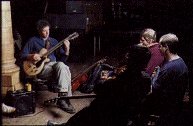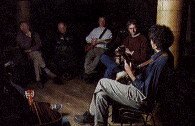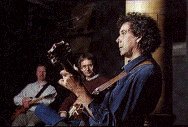David Mead of 'Guitar Techniques Magazine'
pictures by James Crumpsty
May 1999
 " I THINK IT WOULD DO A LOT OF GOOD if they actually banned people from practising the guitar"
" I THINK IT WOULD DO A LOT OF GOOD if they actually banned people from practising the guitar"
Of course, this doesn't mean that all would-be jazzers and readers can lay down their instruments and relax - that's not exactly what the ex-Soft Machine stringsman meant :
"People who learn guitar tend to place the emphasis on practising alone in their rooms with a metronome rather than developing their skills by playing together with other musicians. The first generation jazzers didn't waste their time practising; they jammed together and in doing so picked up valuable stuff like timing and phrasing. You don't do that by sitting alone day after day."
Recalling his time playing with Stephane Grappelli, John continues:
"Stephane hated rehearsing - he just couldn't understand it. Neither could he understand why the rest of his band would be practising in their hotel rooms whilst he sat and watched TV! It was just something which, to him, was a totally foreign concept."
Having said all that, John is one of a select few jazz musicians who takes part in the teaching of jazz at summer schools or workshops. We caught up with the man himself at a jazz workshop in Colchester.
Do you do a lot of workshops?
"I do quite a few, yes. I usually do some sort ofjazz summer course somewhere, I used to do quite a lot in Germany, and every now and again a gig includes a workshop. I quite enjoy doing them actually; I prefer them to one-to-one teaching which I find much harder. Workshops are a more communal thing with people asking questions and so on."
Do you find that the same sort of questions come up all the time at different workshops?
"Yeah. They haven't really changed since I've been doing them, although there was a period where a higher level of technical proficiency came in. hut that seems to have died down a hit. People always seem to have the same prohlems, like playing over changes and getting jazz timing, or feel - but particularly what you do
over chord changes. Playing with other people, listening and so on, seem to he perennial problems. People don't seem to have too much of a prohlem with technique - getting their scales down and all that."
Is there a central point which is missing from many jazz students' studies, then?
"A lot of the emphasis on scale study is slightly misplaced, especially when it comes to playing over changes. Something I always mention is that jazz improvising employed no scales until the middle 60s. That's when rock and jazz improvising started
merging and it hecame scalar. It was John Coltrane and Miles Davis who, in the late 50s, started using scales as opposed to chord tones. I bought Miles' Kioda Blue album in t972 and read the liner notes where it talks about scales and I thought: But you play music with scales - that's what you do isn't it?. I hadn't clocked it at
that stage, but basically, before that everybody was playing chord tones and passing notes. If you listen to Joe Pass or Wes Montgomery and guys like that, they're playing chord tones and everything else is a passing tone embellishment, really. And that applies to everyone up to George Benson who is the last player in that tradition - not
including the players who have now retrospectively revived it. If you go and
listen to a jazz guitarist now, he might be playing in that way, but in the historical
sense that line finished with George Benson.
"Then you get McLaughlin, Al Di Meola, Allan Holdsworth - these people are playing
scales. So a lot of people going to guitar schools over the last 15 years have learned
scales and they find it difficult to apply that kind of thinking to playing be-hop or
straight jazz. It doesn't sound right; I mean, it can sound great, but it doesn't sound the same. Someone who plays with a scalic approach in be-hop is John Scofield who's
got a very particular way of playing, but it sounds different from the style you'd
associate with straight jazz guitar. And that's why it sounds different: because he's
thinking in terms of scales rather than chord tones. The point is, if you're playing
over a lot of changes and you think of chord tones, it's easier to get around things
because you've got the visual shape of the chord on the fingerboard - that's how
people like Joe Pass played. Django Reinhardt never played a scale! I used to
think that Charlie Parker was playing scales. In fact, Parker's a classic: acres of passing tones all the time and it's all thought of as chord tones with passing notes; the minute you clue in to that there's no problem."
 So how can people get out of the scalic approach rut?
So how can people get out of the scalic approach rut?
"Well, you can get out of that rut quite easily! Say you're playing on C minor -
instead of thinking: Am I playing on C Dorian, C Aeolian or C Pbrygian? you say
to yourself: Okay, I've got C minor seventh arpeggio tones - C, E~, G and B~ and, say,
the ninth, D - everything else I play will merely be a connecting point. So you get a totally different sound. That's one way out of that scale/mode rut, if it is a rut."
But you'd agree that a modal approach to playing has its place?
"Of course, but ever~one seems to have learned modes in a most confusing way. Today at the workshop we were talking about 07 and the appropriate scale for that chord and someone said, "Oh, that's the G scale starting on D!" but that, to me, is a complete
mistake. If you think like that you'll immediately get confused because if you're thinking in terms of another parent scale every time you've got a scale it can get very confusing.
"There's nothing wrong with saying that D7 is the same as G, but when you're improvising and you're trying to think quickly and clearly, you don't want a lot of clutter in your head. I used to have problem with the minor7~5 chord; I came to theory pretty late, I'd already done a lot of playing before I learned any theory. But I
could never think what to play over a minor7-5. So people used to say, "Oh just play the major scale a semitone up" But when I got to it, I'd just stop! I'd be thinking: Oh, that's the major scale a semitone up - but by then it had gone by. The main problem with that method is that your ear is hearing a Bm7i5 and your mind is saying C. It causes so much anxiety in your mind because you're hearing a B and that's why it's so important to play all the scales from the root. In other words, you play a B Locrian, if that's the one you're going to use, starting on B. You might as well forget that it's the same as C because it doesn't sound anything like C!
"All this transposition thing is a total waste of time; you've just got to learn the scales as they are and then you can really use them. In other words, you don't practise by playing C to C and saying, "That's the lonian mode", and then 0 to D and calling it 0 Dorian and so on. You start them all on C so that means that you learn them from root position and you can actually hear the difference. What's more, you're not learning them in relation to something else, you're learning exactly what they are. Of course that makes it more difficult; there's more to learn and so I think that then the
point is to restrict yourself to a certain number that are important. There's
no necessity to learn millions and millions of different scales, I don't think. If you learn a few good scales then that's enough; it's much better to learn two or three really well than to learn a million and halfjust so you can say that you can play the Hungarian Gypsy minor! There's so much more to life than scales."
 Which scales are important to learn?
Which scales are important to learn?
"Obviously the major scale is important as is the Dorian scale, the Fhrygian not particularly, Lydian is pretty important, the Mixolydian is obviously vital and the Aeolian and the Locrian are less important. It's good to know them all, but you might as well sort out which ones you absolutely must know and I think you must know the lonian, the Dorian and the Mixolydian. You really need to know those to get by in most contexts. You wouldn't have to know their names, either; you could think of them as the major scale, the minor seventh scale and the dominant seventh scale."
So, when you teach people to play over chord changes, do you first take a simple diatonic chord arrangement and then break it into arpeggios?
"Yes, I suppose so. You'd probably start with a simple sequence and say this is how
you can do it. Start with the basic arpeggio and then build it up with extended chord
tones and then start using altered tones : sharpened or flattened ninths - that sort of
thing. As long as it's logical and clear, people can use it to improvise with."
Let's get specific: take a Gmajor7. How would you teach people to improvise over that chord?
"First off you've got your arpeggio tones. I'd extend them to include the ninth
and the sharp 11th, the 13th - which adds up to the whole Lydian scale if you think
about it! Then you start connecting them up using chromatic tones; the important
thing is that the chord tones must fall on the beat."
Are there any other ruts which you find that jazz pupils will get themselves into?
"Phrasing is one; you get a lot of people who can play pretty well, know a lot of
scales and a lot about changes, but they don't have a clue about phrasing. Offen it's
b~cause they've practised on their own and it's not something that they've developed in
a musical context with other people. You find that if you haven't had experience
playing with other people; you tend to play all the time and never stop! That's been a
tendency amongst improvising jazz musicians since practice was invented.
People play all the time and don't leave any gaps. Phrasing is about leaving gaps and if you listen to the really great players like Metheny or Scofield you'll hear that they leave a lot of gaps.
"Another thing is that people tend to play on the beat all the time because that's
what they do when they're practising. But if you don't play on the first beat and finish on, say, the 'four-and' of the bar, it sounds better, although you could be playing the exact same notes. This is where the obsession with scales kind of blinds people. Think of any good player from any style who's really popular - Mark Knopfler, Larry Carlton - and you're listening to good phrasing. It's probably more important than anything we've talked about so far - it's the main thing."
back to top